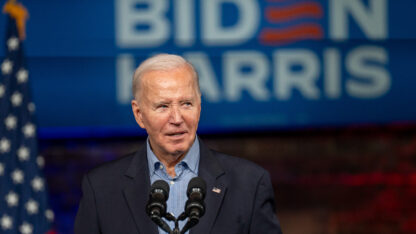Warnock optimistic on priorities of drug price negotiation, premium tax credits

U.S. Sen. Raphael Warnock says he has been assured that two of his health care priorities are in the Senate’s climate, health and tax bill that would move forward key elements of President Joe Biden’s domestic agenda.
The proposal had seemed to stall earlier when Sen. Joe Manchin III, a moderate West Virginia Democrat, was reluctant to support a spending plan as inflation put pressure on American households. But Manchin and Senate Majority Leader Chuck Schumer announced last week they had reached a deal, which has been branded the Inflation Reduction Act.
The package represents a major step toward addressing the climate crisis, but it also features major health care initiatives, including a three-year extension of pandemic-era premium tax credits that were set to expire this year. The proposal would also empower Medicare to negotiate some prescription drug prices.
Using a budget process called reconciliation, a bill that draws the support of all 50 Democratic members of the U.S. Senate, with a tie-breaking vote by the vice president, cannot be blocked by Republicans using the filibuster.
All eyes are now on Democratic Arizona Sen. Kyrsten Sinema to see whether she will support the measure, and the package is also being scrutinized to ensure the provisions fall within what is allowed in a budget bill, meaning the proposal has more hurdles to clear.
But on Wednesday afternoon, Warnock celebrated the health care provisions in a phone interview. The measure would cap monthly out-of-pocket costs for insulin at $35 and block prescription drug prices for seniors on Medicare Part D from exceeding $2,000 annually – two of his health care priorities.
“This is transformational. It is very meaningful for folks who are on the ground in Georgia right now trying to pay for their insulin, trying to manage their health care – many of them in the very eve of their lives,” Warnock told the Georgia Recorder.
But the package also notably left out a proposal championed by Warnock that made it into an earlier iteration of the package last year: a federal work-around for states like Georgia that have not expanded Medicaid under the Affordable Care Act. About a half million Georgians could gain health coverage through Medicaid expansion.
Warnock called the extension of the enhanced premium tax credits good news but said he would continue to push for coverage for low-income adults without health insurance.
“Folks were in danger of losing their health care, so this bill will fix that,” Warnock said of the extended premium tax credits. “What I would like to see us do is extend those same tax credits to folks who are in the coverage gap.
“In Georgia, we’ve got about 640,000 Georgians, mostly the working poor. Those are the folks who are in the gap. And I’ll continue to press and fight, even to the floor, to make sure that these folks get the health care that they deserve,” he said.
This story was provided by WABE content partner Georgia Recorder.








